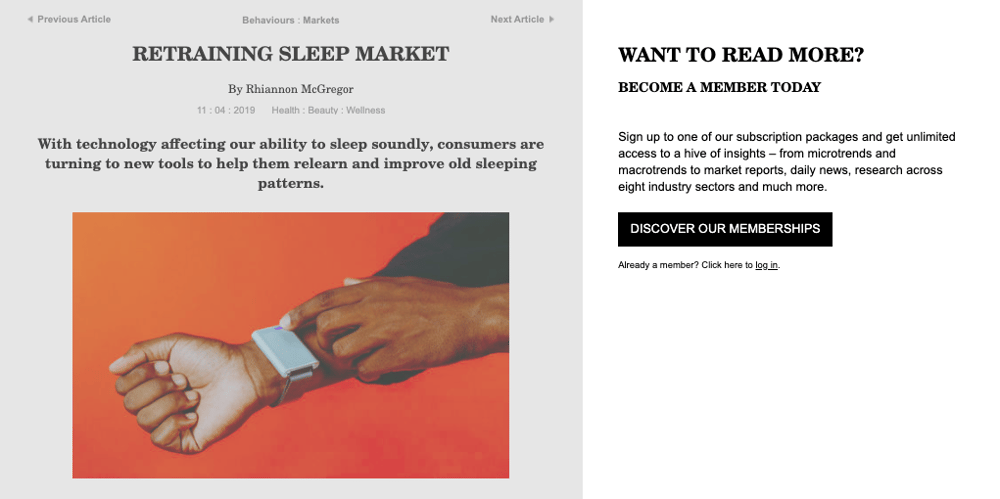Retraining Sleep Market
With technology having fundamentally inhibited our ability to sleep soundly, consumers are seeking new tools to help them with sleep retraining and to relearn positive sleeping patterns
Sleep has become a vital subset of the wellness sector, and technology-based tools and apps abound.
Yet many of the trackers and devices dedicated to inducing or achieving a good night’s sleep have failed to address the roots of the problem.
‘Before the lightbulb was invented people didn’t think about sleep because they just fell asleep when it was dark and woke up when the sun rose,’ says Meeta Singh, a doctor at Henry Ford Sleep Disorders Center. ‘Now you can have light 24 hours a day, so sleep has to be thought about.’
As a result, sleep-deprived individuals are going back to basics, seeking the tools that will help them retrain their sleeping habits from scratch.
Sleep retraining
Sleeping, like breathing, may be a necessity, but our technology-driven society is fuelling a culture of deprivation. Young people are growing up with poor sleeping habits instilled in them from an early age and this is having a profound effect on their overall wellbeing.
Emphasising this, a study in the British Medical Journal (BMJ) found that sleep has a greater impact on children’s wellbeing than bullying, physical activity and screen time. As a result, healthier habits that go beyond basic survival are being taught to optimise wellbeing.
In the UK, the national body for personal, social, health and economic (PSHE) education professionals has joined forces with the Evelina London children’s hospital to formulate its Sleep Factor lesson plans. Available to school teachers across the UK, these are designed to help students recognise good-quality sleep and understand why it's important. It all helps them to identify habits and routines that promote better sleep, and explains how and why sleep patterns change during adolescence.
Soporific tech
Studies show that about 25% of people in the US now experience acute insomnia each year, which is categorised by a difficulty in either falling asleep or staying asleep (source: University of Pennsylvania School of Medicine). Reluctant to rely on sleeping pills, consumers are turning to sleep-inducing technology to help them fall asleep.
The online mattress company Casper has launched Glow, a sleep-inducing lamp controlled by gestures: flip to turn it on, twist to adjust brightness and shake for low-level light. Designed with in-built sensors that match the lamp’s brightness to the room it’s in, Glow has been developed as a portable device that caters for every stage of the sleep process, from lulling users to sleep to guiding them through the dark if they get up during the night.
As sleep technology becomes more responsive to our sleeping patterns, there is a growing awareness among people of the need to re-engage with more natural sleeping behaviours, driving a new wave of devices that act in a much more intuitive way.
Embr Wave is a new category of wearable device that helps to induce a soporific state by automatically adjusting the wearer’s perception of temperature. By using heat as an ‘untapped power source for sleep improvement’, Embr Wave uses artificial intelligence (AI) to send pulses of warmth to the wearer’s wrist for a few minutes that gradually slow to match the user’s breathing rates, lulling him or her to sleep.
‘The regularity and duration of sleep is important in predicting how long people will live’
Meeta Singh, a doctor at Henry Ford Sleep Disorders CenterWant to read more?
Become a member today!
Sign up to one of our subscribtion packages and get unlimited access to a hive of insights - from microtrends and macro trends to market reports, daily news, research across eight industry sectors and much more.
Discover our memberships
Already a member? Click here to login

